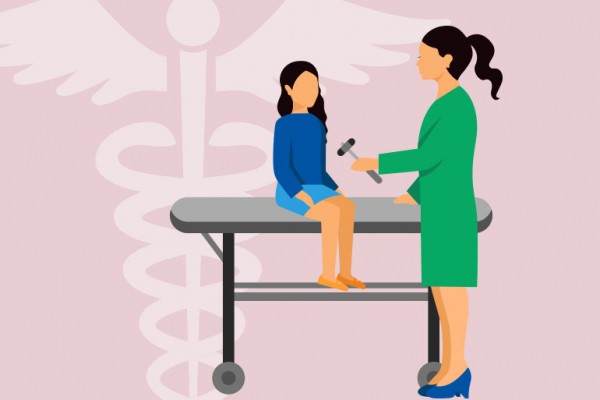Luz felt relieved and grateful when she learned that her 16-year-old son qualified for full coverage under Medi-Cal. Now, she worries that the information she provided to the government health program could put her family at risk of deportation.
Luz’s son is one of nearly 190,000 children who have enrolled in Medi-Cal since California opened it to undocumented children last year. Luz, her husband and her son came to Merced, Calif., from Mexico without papers about 10 years ago. Luz asked that the family’s last name not be used, for fear of being identified by federal immigration authorities.
In the current political climate, immigration and health advocates worry that children, like Luz’s son, will drop out of Medi-Cal and that new kids won’t enroll out of concern that personal information may be used to deport families.
Luz would need to renew her son’s coverage in October, but she remains undecided even though the program paid for his hospital visit when he injured a foot. “I’m still thinking about it,” she said.
Last May, the state Department of Health Care Services (DHCS) implemented the new “Health For All Kids” law allowing California children under 19 to receive full Medi-Cal benefits, including dental care and mental health, regardless of their immigration status. Previously, undocumented children could receive only emergency care through Medi-Cal.
California followed Illinois, Massachusetts, New York, Washington and the District of Columbia in offering state-supported health coverage to children in the country illegally.
Medi-Cal is California’s version of the federal Medicaid program for people with low incomes. The federal government pays for a significant portion of the California program, as it does for all states. But coverage for undocumented kids is entirely funded by the state.
From last May to through April 6, 189,434 undocumented children signed up for the program, according to the most recent state data. The health care services department estimates that another 61,000 children are eligible but not enrolled. Advocates say now is the time for a push to sign up these “harder-to-reach” children and to encourage those already in the program to stay.
Immigrant families have become more reluctant to share personal information with government programs because of the Trump administration’s planned changes in health care and immigration policies, according to a recent survey of 62 individuals working for pediatric practices, community clinics, local public health departments and hospitals serving immigrant communities throughout the state.
Immigrants are also increasingly skipping doctor appointments because of similar concerns, according to the survey, conducted in March by the advocacy group Children Now.
Kelly Hardy, Children Now’s managing director of health policy, said some families even have sought to withdraw their children from the Medi-Cal program because they fear that their immigration status might be shared with immigration officials.
“Holding on to the kids who have recently enrolled is going to become critically important,” Hardy said. She said she hopes families will see that the coverage is a boon to their health and will not be scared away.
In an email last week, the DHCS reiterated to California Healthline that an applicant’s immigration status is “only used for the purposes of determining Medi-Cal eligibility.”
But that doesn’t eliminate the worry for some parents.
“This fear is horrible. We don’t know who to trust,” Luz said.
Before the coverage-for-all law took effect last year, undocumented children could get coverage through the Healthy Kids insurance program in some California counties. However, many of those children have been transferred to Medi-Cal, and the Healthy Kids programs are closing down.
Carlos Jimenez, a health policy advocate at the Mixteco Community Organizing Project in Oxnard, Calif., said the nonprofit doubled its enrollment assistance efforts after the law was implemented.
Community health educators known as promotoras, spread word about the new law in farm fields, in front of supermarkets and outside churches. Last year, enrollment counselors saw up to 400 people a month who had questions about Medi-Cal, the majority looking to enroll their children, Jimenez said.
But after the November presidential election, enrollment counselors at Mixteco saw the number of people seeking help drop by nearly half, Jimenez said. Staffers had expected more inquiries about renewals by now, he said.
Most people ask whether enrolling an undocumented child would bring any problems with the U.S. Immigration and Customs Enforcement agency, Jimenez said. “We tell them their information is safe. But even then, they’re afraid.”
The Children Now survey showed that participants had questions about the future of Medi-Cal for undocumented children — in particular, whether it would continue if the Affordable Care Act were replaced.
In an interview with California Healthline in February, Sen. Ricardo Lara (D-Bell Gardens), who authored the Health for All Kids law, said there was no reason for people to be concerned about the program’s durability.
Democratic Gov. Jerry Brown continues to make this program a priority, Lara said, noting that California is spending $279.5 million to continue benefits for undocumented kids this year. That’s up from the $188 million it provided for the program last year.
Health advocates in California are hoping to extend the program to young adults. Earlier this month, the California Immigrant Policy Center and Health Access California, launched an online petition requesting that full Medi-Cal benefits be made available to people ages 19 to 26.














